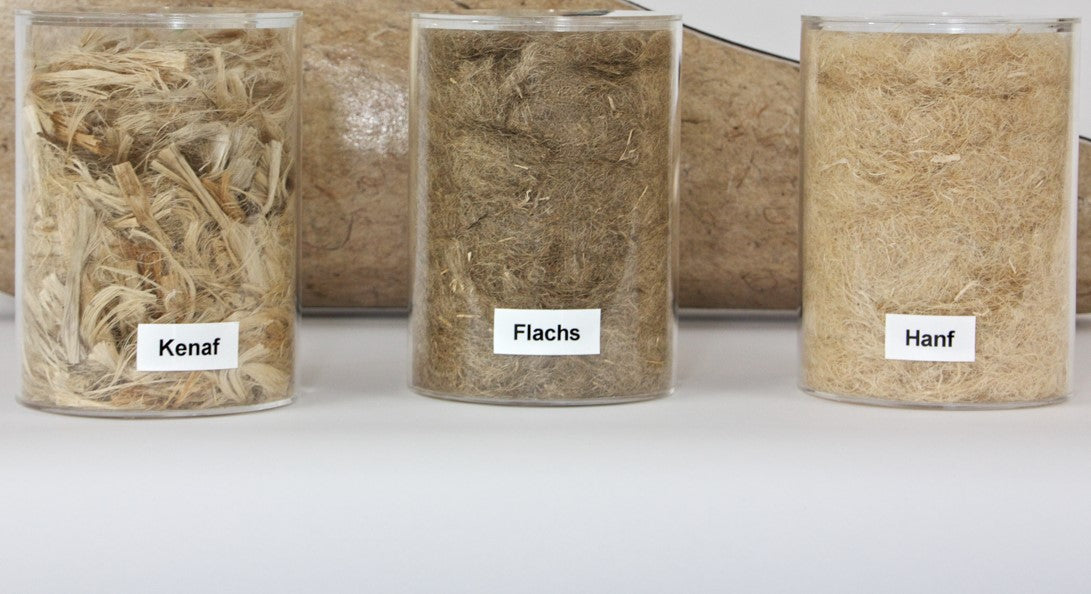As the world collectively strives for a more sustainable future, natural fiber composites can bring us a step closer to reaching that goal. They are made from plant-based, renewable fibers such as flax and hemp and offer an eco-friendly alternative to traditional synthetic composites like polyester or plastics. In this blog post, we'll dive into the incredible potential of natural fiber composites and discuss their unique advantages, including sustainability, CO2 balance, short supply chains, biodegradability, recyclability, and the wide range of innovative products that can be made from these fibers.


Sustainability and CO2 Balance: A Gamechanger compared to Synthetic Composites
The environmental benefits of natural fiber composites are substantial. They have a lower carbon footprint compared to synthetic fibers because their production process consumes less energy and emits fewer greenhouse gases. As they are made from fibers such as flax and hemp, the raw materials are renewable and can be grown locally and eco-friendly. Compared to Polyester, which is made from petrochemicals, the sustainability of natural fiber composites is a big advantage.

Material Supply Chain: Grown sustainably
The plants used to make these fibers are renewable resources that grow quickly and require relatively little water and fertilizers. This allows for a steady, local supply, reducing transportation and environmental impacts. Also the impact on soil is limited and plants can be re-grown many times. It is a supply chain that is both sustainable and reliable. Our suppliers are based in Germany, Sweden and the Netherlands, which means that the materials don’t have to be transported by sea.

Recycling: From Waste to Wonder
Unlike most composites, Natural Fiber Composites are highly recyclable. They can be reprocessed into new products, reducing waste and environmental impact drastically. This helps to conserve resources and create a circular economy that minimizes the environmental impact of product manufacturing and disposal. The key to making products circular is having the right processes set-up on the manufacturer side to ensure proper recycling of these materials. An example of this is our Closed-Loop setup for recycling.

Biodegradability: Returning to Nature
One of the most significant advantages of natural fiber composites is their biodegradability. Unlike synthetic fibers, which can take centuries to break down and have a devastating impact on the environment if not disposed correctly, natural fibers decompose in a matter of months or years. This reduces waste and landfill buildup, easing the strain on our environment.
In case you want to dive deeper into the topic of recycling vs. biodegrading you can head to our blog post here.
Manufacturing Aspects: Compression Molding Natural Fiber Composites
Compression Molding is a process where material is heated in a contact heater and then pressed into a mold before it is left to cool down and harden. A wide variety of products can be produced in this way and the product specific molds are cost-effective compared to other production processes and have a long lifetime. Energy consumption and waste are reduced compared to other manufacturing methods as compression molding Natural Fiber Composites requires a lower temperature and the excess material can be recycled. With this method, there is also no need of toxic glues which makes it even more eco friendly.

Natural fiber composites present a promising alternative to a lot of non eco-friendly products used and manufactured today. When looking at sustainability, CO2 balance, biodegradability, recyclability and increasing supply chain challenges these fibers are becoming more and more important to a variety of applications. As we continue to innovate and strive for a greener and more sustainable future, it's clear that natural fiber composites will play an important role in shaping a more sustainable tomorrow.

